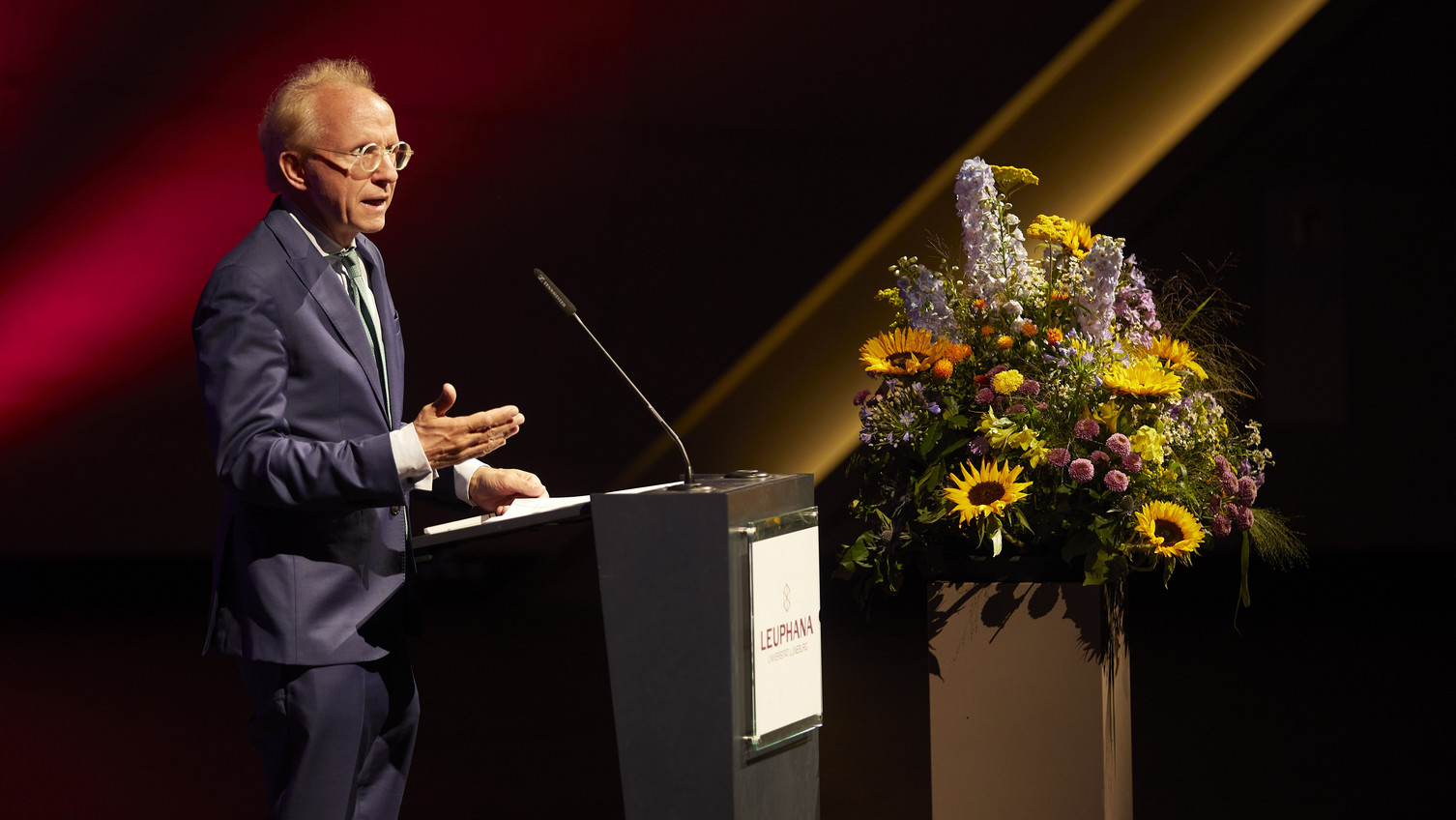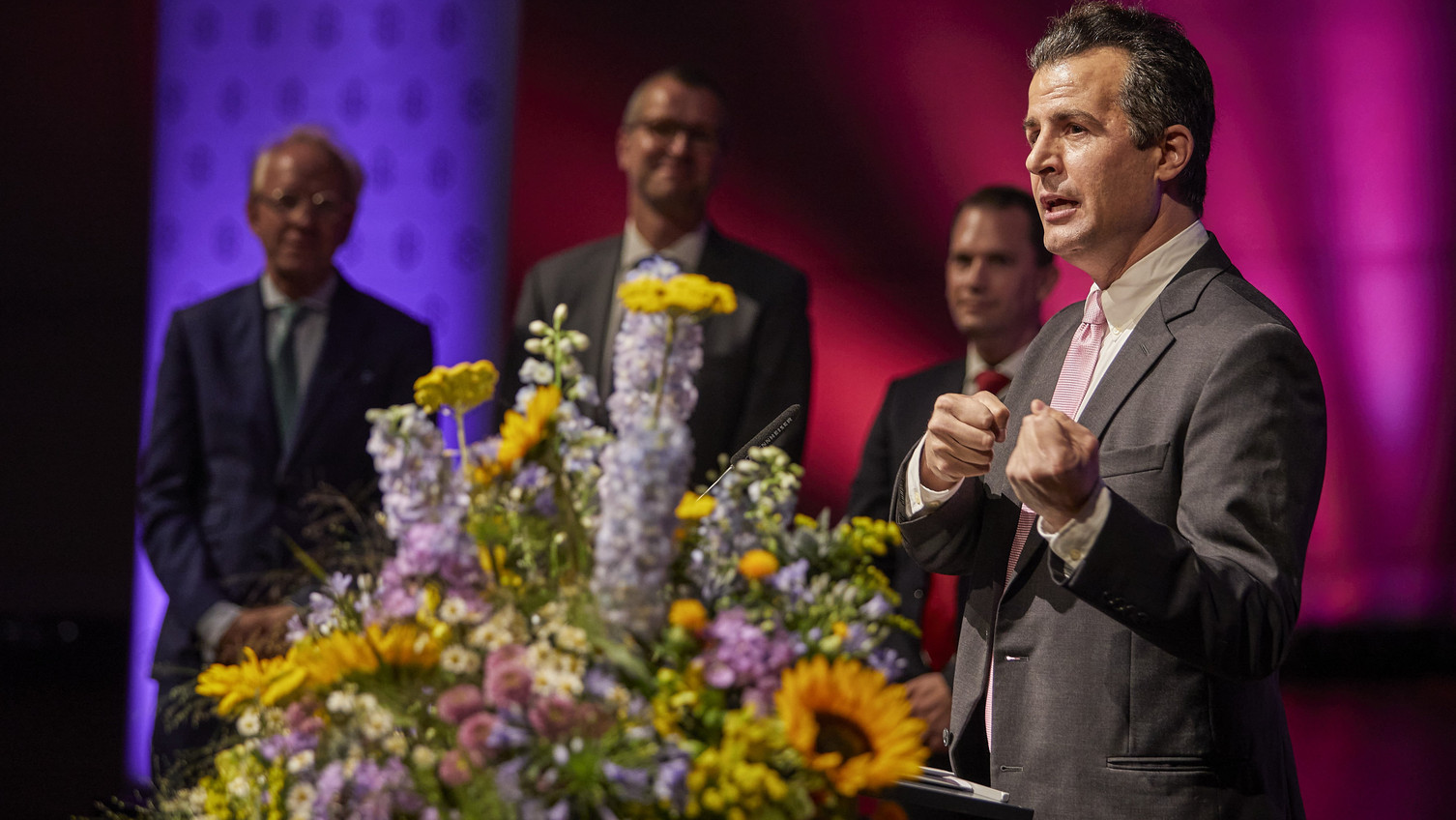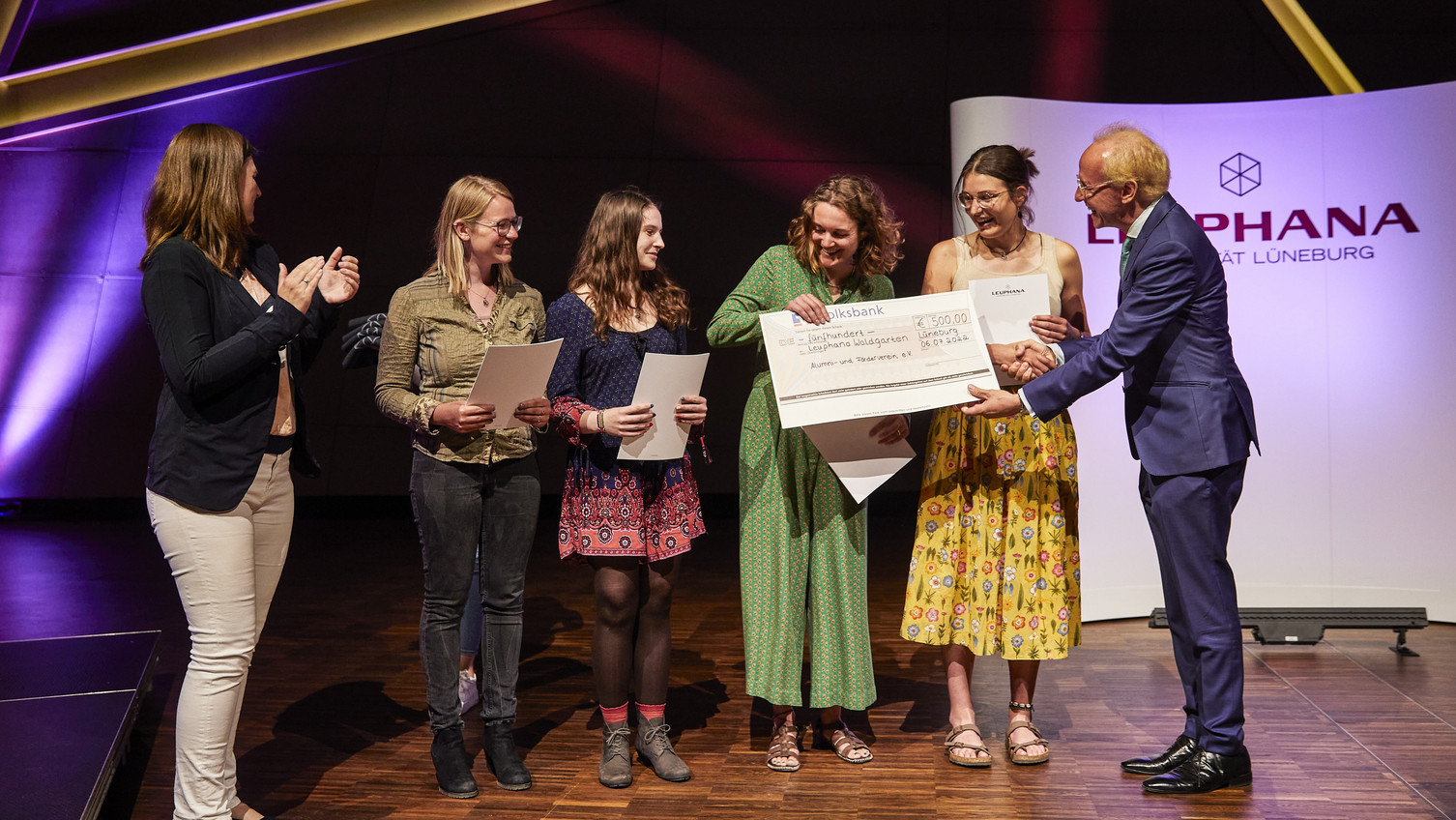Dies Academicus 2022: "A University Needs Love and Care"
2022-07-07 It was a "special Dies Academicus", as President Sascha Spoun announced in his welcome address at the beginning of the event. For the first time in two years, the guests were able to spend the festive evening and the subsequent summer party together in the Libeskind building. Groundbreaking teaching, innovative study models and outstanding student engagement were the focus of the University's day of celebration.
In his keynote address on the occasion of the Dies Academicus, Spoun looked back on the past academic year and raised the question: "Leuphana is on a good path - but what about us?" Looking at the researchers and teachers, he turned to the trend of "knowledge production". Knowledge, he said, has acquired a commodity character whose resources - money and time - are precious. Politics and society have expectations of research efficiency, of a maximum of publications and patents. "This makes inefficiency an offence." But: thoroughly efficient research "in series" - that is not possible at all. "We ask the same questions over and over again without finding an answer, we ponder, doubt, leave things half-finished, we have good ideas but don't pursue them for lack of time. And with all this terrible inefficiency, we do nothing wrong." Sascha Spoun pleads for this "inefficient background noise", which is unpleasant but indispensable for the progress of science. "I would like to invite you today to consider this own background noise as a conditio sine qua non for ultimately successful and groundbreaking research, and to accept it in parts," said Spoun, calling for measuring oneself not only by output and efficiency, but by one's own curiosity, passion and courage to enter new territory.
The focus of the evening was the awarding of honorary doctorates. The Faculty of Management and Technology presented the special award to Prof. David J. Malan, Gordon McKay Professor of Computer Science at Harvard University, for his outstanding achievements in teaching. He is a great source of inspiration for universities worldwide, emphasised President Spoun. "We honour an outstanding scientist who has revolutionised computer science teaching," said Prof. Dr. Burkardt Funk from the Institute of Information Systems in his laudation. David J. Malan's course "CS50" at Harvard University is the world's best-known introductory course in computer science. The Harvard professor is a pioneer in the field of digital teaching - long before it became relevant due to the pandemic. He offers his lectures as online courses, which are now attended by over 3.7 million people worldwide. According to Funk, Malan's teaching philosophy is also an outstanding inspiration for Leuphana, for example in the conceptualisation of the DATAx programme.
A milestone of the past academic year for Leuphana University was the founding of the new Faculty of Political Science and the introduction of the model law degree programme, which is unique in Germany. The programme enables students to complete both the Master of Laws degree and the preparation for the state law examination following their Bachelor's degree. The special support the project is receiving is shown by the funding from both public and private sources: the state of Lower Saxony is initially funding the new study programme with 2.5 million euros from funds of the Lower Saxony Advance of the Volkswagen Foundation. Björn Thümler, Lower Saxony's Minister for Science and Culture, handed over the corresponding funding notification in the evening to applause. In addition, the non-profit Joachim Herz Foundation is funding the model degree programme with a sum of 750,000 euros for the Joachim Herz Doctoral College in Law. Prof. Dr. Axel Halfmeier, Dean of the Faculty of Political Science, emphasised that the project is a difficult manoeuvre that requires "all hands on deck": "It's a challenge, but I know we can do it." Lower Saxony's Minister for Science and Culture Björn Thümler pleaded for a solution-oriented rather than a problem-oriented approach. An approach that the new degree programme, with its focus on "law in context", takes: "It's about shaping, not preventing." According to the chairperson of the board of the Joachim Herz Foundation, Prof. Dr. Sabine Kunst, the foundation appreciates that the new Faculty of Political Science brings together interdisciplinarity and scientific advancement: "As a foundation, we want to be a pioneer for things that we believe are on the right track."
Special attention was also paid to student engagement at this year's Dies Academicus. "We have an incredibly motivated student body at this university," emphasised Carlotta Eklöh and Julia Gerlach, who served as spokespersons for the General Student Committee (AStA) for a year, in their greeting to the festive congregation. Student engagement is far more than a pastime, but an important contribution to broadening horizons beyond one's studies and initiating social change. This year, the student project "Leuphana Waldgarten" was honoured.The students Jana Böhme, Julia Gobs, Ronja Kaiser and Mercedes Schröder accepted the award for their commitment to science education, which was sponsored by the Alumni and Sponsorship Association. "The 'Waldgarten' is a space for ecological education, a beautiful place of recreation on campus and a 'day sweetener'," remarked Silja Geest and Maite Quensel, who gave the laudatory speech as prize winners of the past Dies Academicus (Arbeitskreis Campusgeschichte). The "Waldgarten" is a lively meeting place, a place of exchange and also creates long-term visibility for the importance of forest gardens in terms of sustainability, said President Spoun.
Having already addressed the evening on the importance of science, teaching, studies and research for the University, full-time Vice-President Christian Brei emphasised the importance of administration for the University to thrive. For this reason, he paid special tribute to the work of the university management, whose employees were not afraid to "go the proverbial 'extra mile'" when it came to, for example, clarifying legal and organisational requirements, personnel administration, campus design, digitalisation or a multitude of other areas of responsibility. "A university needs love and attention," said Brei, and not only from researchers, teachers and students, but also from the university administration, which takes care of the needs and concerns of all university members.



